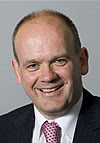
This morning saw the first Mayor's Question Time of 2011. For once the three left wing groups had decided to work together on a common theme - 'the Mayor has misled Londoners'. Perhaps we will see more of this cooperation as the year progresses. The public gallery was also much thinner than usual.
Airport Capacity
The 'progressives' led off with the mayor's recent declaration that London needed more air capacity because there were more flights to China from Paris and Frankfurt. Labour accused Boris of providing misleading figures and a slightly torrid argument about the number of planes between China and London ensued - the crux seemed to be whether Hong Kong was included in the total.
There was broad agreement that Heathrow expansion was beyond the pale, but nods of approval were given to using Manston or building a new Thames Estuary airport, with Stansted, Gatwick and Luton getting mentioned too. Wherever is designated, there will be much local opposition which I suspect means that expansion won't be happening.
Conservative, Andrew Boff spelt out his worries about expansion at City Airport, following the unfavourable court decision earlier this month. Residents are concerned about the increase in flights and consequent noise and pollution in East London.
Cycling
Green, Jenny Jones, had another go about cycling. Given the almost religious zeal which animates Boris on this topic, it is perhaps not the best point to attack - this time she was accusing him of underspending the budget. Andrew Boff made the point that after cycling to work almost on his own for many years, he was now accompanied by many new bike users of all shapes, sizes and ages. So more cyclists, lower spending, sounds good to me. Clearly Jenny knows the price of everything and the value of nothing, as they say...
GLA Pay
With pay for AMs and senior staff frozen this year, Labour's Len Duvall asked if Boris was satisfied with pay rates at City Hall. This gave the Mayor a good opportunity to highlight the decrease in the payroll from Livingstone's £27 million to the new slimline £19 million. In the bad old days 52 people were earning over £80k per year and now this was reduced to just 32 people.
Main Line Railways
Lib Dem Caroline Pidgeon set out to blame Boris for problems on the main line railways, which seems a bit unfair as they are the only part of London's transport network that he doesn't control. She felt there should be more staffed stations and urged the mayor to demand control of the network, within the boundaries of Greater London.
Boris said he was seeking greater involvement in the award of franchises to operators and lauded his success in getting them to accept Oyster pay as you go
Conservative James Cleverly warned of so called 'railheading' during the Olympics, as travellers from outside London parked up in the suburbs to use the transport network. Cheaper tickets for travel to the games would alleviate the problem. Dick Tracey suggested park and ride schemes based on brown field development sites for the duration of the Olympics.
Banksters
Labour's John Biggs attacked the mayor for suggesting that banks might leave the country - after all, they hadn't gone had they? Had Boris been excessively alarmist? John tried at one point to draw a distinction between moral and immoral banks - a very grey and subjective area. For someone who represents the Square Mile and Canary Wharf, John doesn't exactly ooze enthusiasm about their main businesses.
I pointed out that these institutions (moral or immoral) employ many more people than just the highly paid experts we always hear about. Furthermore, they provide essential custom for small businesses that spring up in the shadow of their gleaming towers. Apart from some vague talk about manufacturing, the progressives had failed to articulate an alternative business model to sustain the capital if the financial sector did decamp to Zurich.
Environment
Boris was on the receiving end of a lecture from Lib Dem Mike Tuffrey about reducing the CO2 output at City Hall. The figures were still being calculated but the Mayor expected to have come close to reducing emissions by 10% during 2010. James Cleverly suggested that staff could help by turning off their computer terminals at night - on the 6th floor, which houses the Conservative Group 95% of computers were turned off. On the 7th floor, the home of Labour, Lib Dems, Greens and the Climate Change Fan Club, only 93% were turned off - another case of the progressives preaching rather than practising.
Tube Strikes
Chairman Dee Doocey followed the example of transport chair Val Shawcross, clamping down on Conservative attempts to raise the strike issue again. They seem very keen not to discuss union militancy, possibly because Livingstone is supported by the unions. Unfortunately for travelling Londoners, the matter just won't go away...
Airport Capacity
The 'progressives' led off with the mayor's recent declaration that London needed more air capacity because there were more flights to China from Paris and Frankfurt. Labour accused Boris of providing misleading figures and a slightly torrid argument about the number of planes between China and London ensued - the crux seemed to be whether Hong Kong was included in the total.
There was broad agreement that Heathrow expansion was beyond the pale, but nods of approval were given to using Manston or building a new Thames Estuary airport, with Stansted, Gatwick and Luton getting mentioned too. Wherever is designated, there will be much local opposition which I suspect means that expansion won't be happening.
Conservative, Andrew Boff spelt out his worries about expansion at City Airport, following the unfavourable court decision earlier this month. Residents are concerned about the increase in flights and consequent noise and pollution in East London.
Cycling
Green, Jenny Jones, had another go about cycling. Given the almost religious zeal which animates Boris on this topic, it is perhaps not the best point to attack - this time she was accusing him of underspending the budget. Andrew Boff made the point that after cycling to work almost on his own for many years, he was now accompanied by many new bike users of all shapes, sizes and ages. So more cyclists, lower spending, sounds good to me. Clearly Jenny knows the price of everything and the value of nothing, as they say...
GLA Pay
With pay for AMs and senior staff frozen this year, Labour's Len Duvall asked if Boris was satisfied with pay rates at City Hall. This gave the Mayor a good opportunity to highlight the decrease in the payroll from Livingstone's £27 million to the new slimline £19 million. In the bad old days 52 people were earning over £80k per year and now this was reduced to just 32 people.
Main Line Railways
Lib Dem Caroline Pidgeon set out to blame Boris for problems on the main line railways, which seems a bit unfair as they are the only part of London's transport network that he doesn't control. She felt there should be more staffed stations and urged the mayor to demand control of the network, within the boundaries of Greater London.
Boris said he was seeking greater involvement in the award of franchises to operators and lauded his success in getting them to accept Oyster pay as you go
Conservative James Cleverly warned of so called 'railheading' during the Olympics, as travellers from outside London parked up in the suburbs to use the transport network. Cheaper tickets for travel to the games would alleviate the problem. Dick Tracey suggested park and ride schemes based on brown field development sites for the duration of the Olympics.
Banksters
Labour's John Biggs attacked the mayor for suggesting that banks might leave the country - after all, they hadn't gone had they? Had Boris been excessively alarmist? John tried at one point to draw a distinction between moral and immoral banks - a very grey and subjective area. For someone who represents the Square Mile and Canary Wharf, John doesn't exactly ooze enthusiasm about their main businesses.
I pointed out that these institutions (moral or immoral) employ many more people than just the highly paid experts we always hear about. Furthermore, they provide essential custom for small businesses that spring up in the shadow of their gleaming towers. Apart from some vague talk about manufacturing, the progressives had failed to articulate an alternative business model to sustain the capital if the financial sector did decamp to Zurich.
Environment
Boris was on the receiving end of a lecture from Lib Dem Mike Tuffrey about reducing the CO2 output at City Hall. The figures were still being calculated but the Mayor expected to have come close to reducing emissions by 10% during 2010. James Cleverly suggested that staff could help by turning off their computer terminals at night - on the 6th floor, which houses the Conservative Group 95% of computers were turned off. On the 7th floor, the home of Labour, Lib Dems, Greens and the Climate Change Fan Club, only 93% were turned off - another case of the progressives preaching rather than practising.
Tube Strikes
Chairman Dee Doocey followed the example of transport chair Val Shawcross, clamping down on Conservative attempts to raise the strike issue again. They seem very keen not to discuss union militancy, possibly because Livingstone is supported by the unions. Unfortunately for travelling Londoners, the matter just won't go away...
And this afternoon we saw the results of the 'progressives' efforts in a brief Evening Standard piece, evidently based on a joint press release which gave credit to Labour, Lib Dems and Greens, without naming any individual member. The article mentioned several matters which were not even raised during debate, indicating that the release had been drafted and sent out before the meeting took place. The intended message was 'Boris misleads Londoners' but the real message is 'Vote Labour, Green or Lib Dem if you want Livingstone back'.














